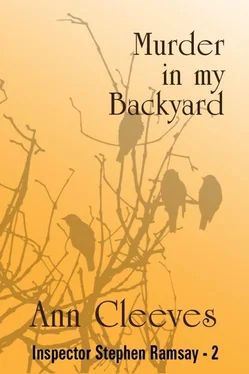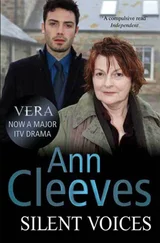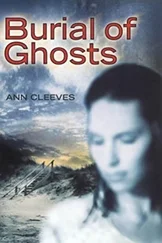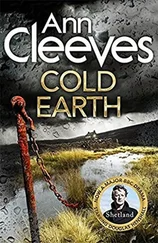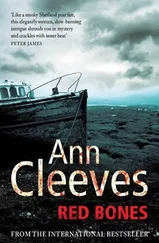Ann Cleeves - Murder in My Backyard
Здесь есть возможность читать онлайн «Ann Cleeves - Murder in My Backyard» весь текст электронной книги совершенно бесплатно (целиком полную версию без сокращений). В некоторых случаях можно слушать аудио, скачать через торрент в формате fb2 и присутствует краткое содержание. Жанр: Детектив, на английском языке. Описание произведения, (предисловие) а так же отзывы посетителей доступны на портале библиотеки ЛибКат.
- Название:Murder in My Backyard
- Автор:
- Жанр:
- Год:неизвестен
- ISBN:нет данных
- Рейтинг книги:5 / 5. Голосов: 1
-
Избранное:Добавить в избранное
- Отзывы:
-
Ваша оценка:
- 100
- 1
- 2
- 3
- 4
- 5
Murder in My Backyard: краткое содержание, описание и аннотация
Предлагаем к чтению аннотацию, описание, краткое содержание или предисловие (зависит от того, что написал сам автор книги «Murder in My Backyard»). Если вы не нашли необходимую информацию о книге — напишите в комментариях, мы постараемся отыскать её.
Murder in My Backyard — читать онлайн бесплатно полную книгу (весь текст) целиком
Ниже представлен текст книги, разбитый по страницам. Система сохранения места последней прочитанной страницы, позволяет с удобством читать онлайн бесплатно книгу «Murder in My Backyard», без необходимости каждый раз заново искать на чём Вы остановились. Поставьте закладку, и сможете в любой момент перейти на страницу, на которой закончили чтение.
Интервал:
Закладка:
That was possible, Ramsay thought. If Alice Parry came back into the house after her meeting with Henshaw, she might have wanted to avoid the family. Especially if she was upset. But what had so distressed her about the meeting with Henshaw, a meeting he had described as a friendly discussion?
“She went to the pub on her way back from the Henshaws’,” Ramsay said. “ Did she go there regularly?”
“Almost every night,” Max said. “She claimed she had to go to catch up with the village gossip, but I think she liked the company. She never had a lot to drink.”
“A young woman was seen in the churchyard on the night of your aunt’s death,” Ramsay said. “ Have you any idea who that might have been?”
“No,” Max said. “ I can’t imagine.” He looked at Judy. “ What about you, love? Did you see anyone?”
She shook her head. “ No,” she said. She turned away to pour coffee into tall blue mugs. “I expect it was one of the girls from the village hanging round the bus shelter for the lads.”
She handed coffee and sugar to Ramsay, and they waited for him to speak again.
“There was a discussion on Saturday night about Mrs. Parry’s will,” he said. “If she’d carried out her threat and refused to leave the Tower to James, presumably you would have benefited.”
“Yes,” Max said vaguely. “I suppose we would.”
“That must have put some stress on your relationship with your brother.”
“I don’t know,” Max said. “We’ve never been particularly close. He’s ten years older than me. When you’re a child, that’s too big a gap for friendship. He was always like an uncle, a bit prim and pompous. I resented him rather. We used to go to the Tower together when Alice asked us because it pleased her, but we rarely meet each other socially otherwise.”
“Can you explain his reluctance to help Mrs. Parry in her campaign against the new houses in Brinkbonnie?”
“Oh, yes,” Max said. “It would have been a matter of principle to him, of ethics. He’s a great one for editorial independence.”
There was a moment’s silence while Ramsay drank coffee, then set the mug carefully on the table.
“We’ve discovered who wrote the anonymous letter to Mrs. Parry,” the inspector said. “It was Charlie Elliot. Do you know him?”
“I’ve met him in the pub a couple of times. Has he been arrested?”
“Not yet. We’re having some difficulty in tracing him.”
Judy was sitting on one of the wooden chairs and turned it to face the policeman. As the legs moved over the tiles, they made the harsh sound of chalk on a damp blackboard.
“Do you think he killed Aunt Alice?”
“We don’t know,” Ramsay said. “ Not yet.” He stood up. Judy saw that his coat was creased and crumpled from where he had been sitting. She thought that he probably lived on his own. He made his way up the stairs towards the front door and Max followed. At the doorstep he hesitated, as if reluctant to leave, then turned quickly and walked over the frozen path to his car.
In the kitchen Judy was stacking plates in the dishwasher. Max stood beside her and stroked a strand of hair from her neck.
“Leave that,” he said. “ I’ll do it. You look exhausted. You should go to bed.”
“All right,” she said. She stood and faced him. “Are you coming, too?”
“Soon,” he said. “ I’ll be up soon. I’ll just do this.”
She nodded and made her way slowly upstairs.
Max loaded the dishwasher, then sat at the kitchen table. He waited until Judy was out of earshot. He heard the gurgling in the old pipes, which meant she was running a bath, then went to the phone. Although he knew it was irrational and Judy could not possibly hear him, he conducted the conversation in a whisper. He would not take the risk that she would hear him. When she had finished in the bathroom, he was already upstairs, preparing for bed.
Chapter Eleven
When Stella Laidlaw woke early that Monday morning, she knew it was going to be one of her bad days. A bullying father and a weak, overindulgent mother had left her with a great capacity for self-pity and an inflated idea of her own importance. She was special. She deserved attention, consideration, to be spoiled. When her family failed to live up to her expectations, she threw childish tantrums, swearing, shouting, and breaking crockery, or she punished them by retreating into herself. If she felt any guilt after these scenes, she reminded herself that she was ill and that excused everything. When she woke on that Monday morning, she felt unbearably tense. The skin on her face itched as if it had some allergic reaction to the air in the bedroom. Her hands were sweating. Her breath came in short, shallow gasps. When she had gone to her doctor with these symptoms, he talked of panic attacks, suggested that she might learn some useful relaxation techniques. But Stella knew what she needed to relax and it had nothing to do with lying on the floor taking deep breaths. Today the tension made her angry. She blamed her discomfort on Max, on James, and most venomously on Alice Parry.
At breakfast Stella was at her most imperious, demanding hot coffee and fresh orange juice, and when James provided these, they were rejected or ignored. She wore a white dressing gown with wide sleeves, and to Carolyn, who saw her as if for the first time, she looked like the white witch from Narnia. Carolyn was as tense as her mother. She had found it impossible to sleep and her face was grey and strained. She felt as if she were under the weight of a terrible responsibility, as if she were the parent and these unhappy adults were her children. She stood up and began to pack her schoolbag with books.
“You’re not going to school!” Stella cried. “ Not today. You’ve had a terrible shock, darling. You must stay at home.”
“No,” Carolyn said, frightened. “I’d rather go to school.”
“Why don’t you stay with your mother today?” James said, and she returned to the table, unable to stand the thought of one of Stella’s scenes.
Stella’s swings of mood were unpredictable, savage, and cruel to a sensitive child. Carolyn hated it most when her mother made a fuss in public, but she knew that the times when Stella was silent and withdrawn caused her father the most pain. Yet whatever her mood James was gentle with his wife. He spoiled and petted her, bringing her presents, flowers, dresses. Then he was rewarded by her laughter and her tears of contrition and her protestations that she loved him more than anyone in the world had ever loved before.
After breakfast Stella went to her room. She sat in front of the mirror and stretched her long swan’s neck so that the lines of tension in her face disappeared and she looked beautiful again.
Carolyn began to stack the breakfast plates on the draining board in the smart new kitchen that Stella had planned the summer before then lost all interest in. James hovered behind her, and she felt his misery so much that she turned round to face him. Now that Aunt Alice was dead, she had no-one else left to love.
“Look what she’s doing to us!” Carolyn said.
“She’s ill,” he said.
“If she’s ill she should go to hospital.”
“She doesn’t like hospital.”
“I don’t care,” Carolyn said. “ We can’t go on like this. She’s dangerous. She makes us all different. I can’t stop being angry. The doctor thinks she should be in hospital.”
Her father looked confused. “No,” he said. “You don’t understand. She would hate it.”
Once, not when Stella was loud and dramatic, but when she was tired and childlike, James had sent for the doctor and asked for his help.
Carolyn had sat, unnoticed, at the other end of the room and listened to the conversation. She remembered quite clearly what the doctor had said.
Читать дальшеИнтервал:
Закладка:
Похожие книги на «Murder in My Backyard»
Представляем Вашему вниманию похожие книги на «Murder in My Backyard» списком для выбора. Мы отобрали схожую по названию и смыслу литературу в надежде предоставить читателям больше вариантов отыскать новые, интересные, ещё непрочитанные произведения.
Обсуждение, отзывы о книге «Murder in My Backyard» и просто собственные мнения читателей. Оставьте ваши комментарии, напишите, что Вы думаете о произведении, его смысле или главных героях. Укажите что конкретно понравилось, а что нет, и почему Вы так считаете.
